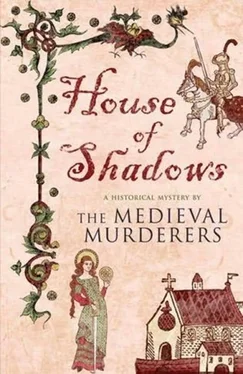Going out into the main dormitory, he found that his assistants had dumped their meagre possessions into small cupboards that stood against the wall. Gwyn had opened the shutter of the nearest unglazed window and was peering out.
‘Bloody cold, Crowner, inside and out,’ he observed glumly. ‘The fog’s clearing but it looks like snow. At least the weather will keep the corpse all the fresher.’
De Wolfe and Thomas moved to his side and looked through the narrow slot in the thick stone wall. Below them was a narrow sloping roof of grey tiles, extending around a large square, with a patch of frosty grass occupying the centre.
‘This is the cloister walk, with the garth in the middle,’ observed Thomas. ‘That must be the chapterhouse and prior’s quarters opposite, with the dorter and frater over to the right.’ These last were the dormitory and refectory for the monks, the lay brothers and domestic servants eating elsewhere. The lofty church formed the side of the cloister to their left, blocking any view of the marshes and river to the north.
Their inspection was interrupted by a creak as the far door opened and another monk appeared in a long habit of Benedictine black which swept the ground. He was tall and thin, with a ring of sparse grey hair below his shaven pate. A mournful face reinforced John’s impression that Bermondsey Priory was not a very joyful establishment. He seemed to glide up the dormitory as if he was on wheels rather than on a pair of feet, and when he reached them he inclined his head in a faint greeting.
‘I am Brother Ignatius, the prior’s chaplain and secretary. I bid you welcome, though regrettably the reason for your visit is not felicitous.’
He addressed his opening speech to Thomas, whom he saw as a fellow priest, but it was the coroner who answered and gruffly introduced the trio.
Ignatius swivelled around on unseen feet and indicated the door through which he had entered. ‘I will conduct you to the prior, who is anxious to speak to you. Then no doubt you will be glad of some refreshment after your long journey.’
The others could almost hear Gwyn’s stomach rumbling at the prospect, for the outsize Cornishman needed to be refuelled every few hours and the last scratch meal on the Saint Radegund was poor fare by his standards. They followed the secretary through the door and down a narrow flight of steps to a dark vestibule with several doors.
‘That one leads into the nave of the church, should you wish to leave your beds to pray,’ said Ignatius. He pointed to one on his left but unlatched another door, which opened into the ambulatory walk around the cloister.
They walked along the flagstoned arcade, which opened between pillars to overlook the sparse lawn of the garth. At the other end of this side of the square, yet another door admitted them into a short corridor. It was noticeably warmer in here than the cellarer’s building or the dormitory, and the cynical Gwyn suspected that the head of the house made himself far more comfortable than his minions. Their guide waved a hand at several rooms on the left.
‘Those are various offices, including mine, but the prior’s parlour is up here.’ He turned into an alcove on the right, where a flight of wooden stairs led to the upper floor. The atmosphere got milder still as they ascended, and when they reached a square hall above it was positively warm, helped by the fact that a window in one wall actually had glass instead of a shutter, a rare luxury indeed. An open door in the opposite wall revealed a small chapel, which Thomas decided must be for the prior’s private use.
The thin monk tapped on another door and entered, reappearing a moment later to beckon them inside. The coroner strode in, determined to assert his royal authority from the start, as he had long experience of some churchmen, with their superior and often supercilious attitudes, coupled with a reluctance to cooperate with his investigations. However, it transpired that in Bermondsey Priory he need have no fears on that score, for Prior Robert Northam was only too anxious for any help he could get. He rose from behind his table and bowed his head courteously to the coroner.
‘I am glad to see that you have arrived safely, Sir John. Your reputation goes before you and I only hope that you can settle this distressing matter expeditiously.’
He had a mellow voice, but there was a strong undercurrent of anxiety in his tone. De Wolfe explained that his clerk and officer were indispensable to his work as coroner, and Robert Northam acknowledged them warmly. He was a stocky man of about fifty, with a bush of dark brown hair, which contrasted all the more with the baldness of his tonsure. His face was square and his features strong, deep lines being etched at each side of his mouth and across his forehead. Though the priory was a French foundation and many of its monks were from Normandy or further south, Northam was English. He had spent some years at the mother house on the Loire before being sent as prior to Bermondsey in 1189.
At a gesture from his superior, Brother Ignatius fetched a chair and placed it for the coroner on the opposite side of the table to the prior, who motioned for Gwyn and Thomas to sit on a bench near the fireplace, where a sea-coal fire threw out a comfortable glow across the chamber.
With his secretary standing dutifully beside him, Robert Northam sat down again and began explaining the situation to de Wolfe. ‘I do not know how much you know of this tragedy, Sir John. I doubt that Hubert Walter was very informative, knowing his nature.’
John nodded his agreement. ‘He told me virtually nothing, prior, other than that a ward of the king had been found dead and as the regular coroner of the verge was gravely ill I was to get here with all speed.’
Northam sighed and steepled his hands beneath his chin as he prepared to tell the story yet again.
‘This house is blessed – or possibly cursed – with a reputation for being a refuge or perhaps a lodging for ladies of high rank. Sometimes I think we should have been a hostel rather than a priory!’ He sounded more resigned than sarcastic, but John sensed a certain bitterness in his tone.
‘We are too conveniently placed for London, virtually within sight of the great city across the river. When the king, God bless him, or one of his high officers of state has a lady in need of protection or safe accommodation, they tend to get landed on us here. We seem to specialize in royal wards, of which there seems an endless supply!’ He folded his arms and leaned on his table, bending forward so that his dark eyes were fixed on de Wolfe.
‘A month ago we had a message from the Archbishop that yet another ward of King Richard was to be housed here, though thankfully Hubert Walter said it was only to be for a short period – in fact, until she was married in the great church of St Paul on the other bank.’
John felt it was time he broke into the monologue. ‘Was that an unusual request, prior?’
Northam turned up his hands. ‘It has happened before – we are within easy riding distance of both the abbey of Westminster and the city’s cathedral. This particular lady was from the midland shires and thus a more local domicile was needed for her to be prepared for the nuptials.’
John waited with more than his usual patience for the prior to continue.
‘The lady – or really girl, for she was not yet sixteen – arrived in mid-January, with her tirewomen and some of her guardians. She was Christina de Glanville, distantly related to Ranulf de Glanville, the renowned former justiciar of England, who died six years ago at the siege of Acre in the Holy Land.’
De Wolfe grunted. ‘I was there myself, as was my officer Gwyn. We well remember de Glanville and his tragic death.’
Читать дальше












